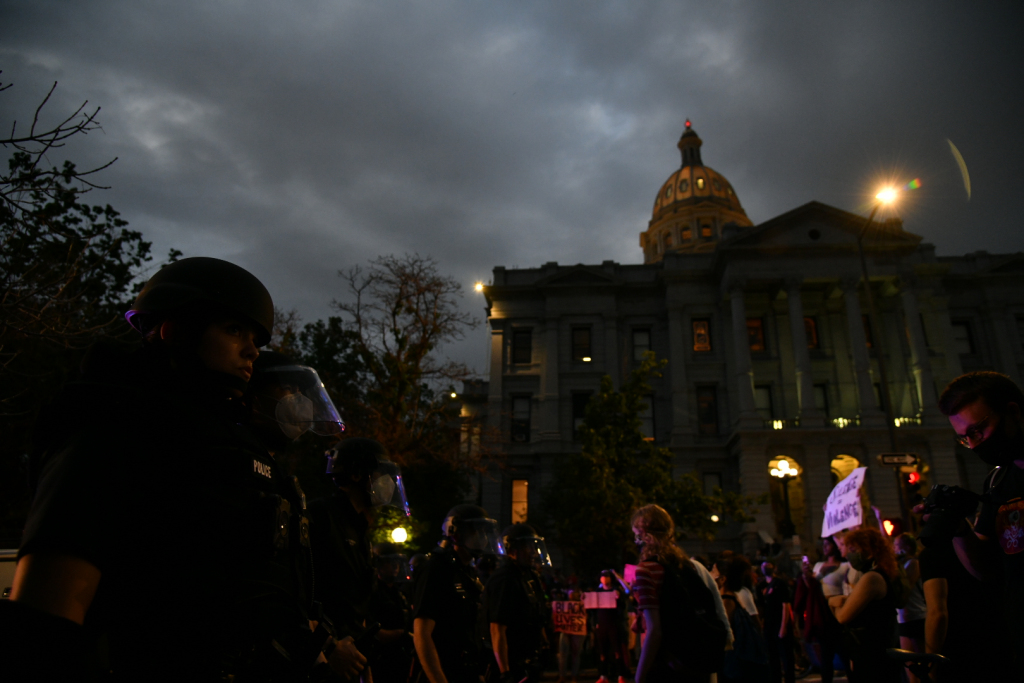Colorado passed one of the most comprehensive police reform packages in the country Saturday, setting limits on police use of force and mandating data collection to make sure cops who are fired from one agency don’t get rehired by another.
Gov. Jared Polis has said he will sign the historic bill into law once it reaches his desk.
“This is, in my estimation, the largest single advancement of individual civil rights and liberties for Coloradans in a generation,” said Denver civil rights attorney Qusair Mohamedbhai.
Colorado’s Senate Bill 217 requires all officers to use body-worn cameras and release footage within 45 days, bans the use of chokeholds and carotid control holds, limits when police are allowed to shoot at a person running away, requires officers to intervene in cases of excessive force or face criminal charges, mandates data collection and allows for officers to be held personally liable for civil rights violations. It also requires the Division of Criminal Justice and the Peace Officer Standards Training board to conduct investigations of all deaths by police.
The final vote in the state Senate on Saturday afternoon puts Colorado at the forefront in adopting a statewide approach to policing changes following protests over George Floyd’s death at the hands of Minneapolis police less than three weeks ago. The Iowa governor signed a similar but less broad bill Friday that bans chokeholds, collects data on use of force and prevents officers who get fired from getting rehired at other agencies. New York also passed a package of bills for police reform this week.
“Colorado is leading the way. We led the way when it came to gun safety reform measures and we’re leading the way now when it comes to police reform measures,” said Sen. Rhonda Fields, D-Aurora, and a bill sponsor.
Some cities across the country are making changes to the police departments in their jurisdictions. Other states are in the midst of making reforms statewide, while others yet are taking a more incremental approach to changes.
For example, City Council members in Minneapolis voted to dismantle the police department and ask voters to approve reforms. In New York, the governor announced a cut to the police department, with the money to be redirected to social services. The Los Angeles mayor made a similar decision.
Denise Maes, policy director for the American Civil Liberties Union of Colorado, which helped write Colorado’s bill, said it will give the state one of the strongest sets of policing laws in the country.
“It’s bold, and in some areas, it will be a leader, and in other areas, it’s standing in line with other states,” Maes said.
One of the biggest wins for supporters of Colorado’s bill — and most contentious for opponents — was the removal of the qualified immunity doctrine. That means victims or their families can sue police officers in their individual capacities for constitutional violations and those officers can be held personally liable.
This provision is similar to legislation introduced federally to address police brutality. The federal bill calls for reforming qualified immunity, improving federal investigations of police practices, incentivizing states to create independent investigative bodies and changing the federal standard for prosecuting cases of police misconduct. It also aims to collect better data on excessive force and misconduct and improve training.
Another major provision in Colorado’s bill is the change in what was previously considered the “reasonable officer” standard. The bill details more objective standards for when officers are allowed to use deadly force: during an arrest if they or others are facing an imminent threat. They would not be allowed to use deadly force to stop someone who is suspected of a minor or nonviolent offense. The goal was to make it easier to prosecute officers who use excessive force.
“I expect that we will see states move pretty quickly to some of the reforms similar to what Colorado is doing,” said Justin Nix, associate professor of criminology and criminal justice at the University of Nebraska at Omaha.
Nix, whose research focuses on police use of force and culture, said he applauds Colorado’s quick, decisive action and believes that’s a good thing, but he also cautions against states moving too fast. Governors should already be thinking about and discussing this type of legislation, he said.
Some parts of Colorado’s Senate Bill 217 were modeled after other states. Herod and Senate President Leroy Garcia, also a sponsor, said they took parts of what other states are doing but also took into account the state’s unique needs.
The bill will put Colorado among at least 23 other states that already have a requirement release to officers’ body-worn camera footage upon request. Colorado will join a handful of other states that are “pioneering the way to collecting better data,” Nix said. Part of Senate Bill 217 requires annual reporting about all use-of-force incidents, not just those that are deadly. Individual agencies will have to report the information for use in a statewide database.
Nix echoes the advice of other policing experts around the country: “The level of government that’s best suited to reform police right now is the state government.”
When left up to individual police chiefs, there’s a lot of variation about what they believe should be released, according to Nix’s research. But, he said, the public deserves transparency.
The road to this point hasn’t been easy. Colorado has passed criminal justice reforms over the years but nothing as far-reaching in one fell swoop. The momentum of the Black Lives Matter movement after Floyd’s death spurred lawmakers to make changes, including Republicans who may have been opposed to such reforms in the past.
“We want accountability, we want transparency, and we got what we asked for,” Republican Sen. John Cooke, a former Weld County sheriff, said Saturday in support of the bill.
Even just a few months ago, Herod said, she was approached by the family members of a man who was fatally shot by police about making massive changes. She said she had to have a difficult conversation with them: Did they want to support something that had a chance of passing or did they just want to make a statement?
But everything has changed since Floyd’s death on May 25, and protesters began marching against police brutality — not just those in Minneapolis but also the police who’ve killed citizens in their own cities.



















